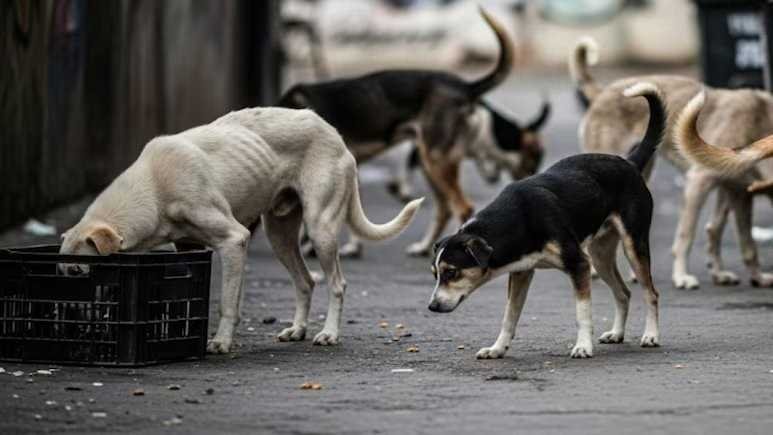New Delhi: The Supreme Court has issued a landmark directive mandating that all stray dogs in Delhi and the National Capital Region be captured and moved to designated shelters within the next eight weeks.
The order, aimed at tackling the growing menace of stray dog attacks, requires municipal authorities and other concerned agencies to set up adequate shelter facilities and ensure the animals are no longer left on the streets.
In its ruling, the court made it clear that once a stray dog is placed in a shelter, it should not be released back into public spaces under any circumstances. Municipal bodies — including the Delhi government, the Municipal Corporation of Delhi (MCD), and the New Delhi Municipal Council (NDMC) — have been instructed to begin immediate removal operations from all localities, extending to the city’s outskirts.
The bench also warned of strict action against any person or organisation obstructing the process of picking up stray dogs. Stressing public safety, the court observed that infants and young children must not be exposed to the risk of dog attacks.
During the hearing, Solicitor General Tushar Mehta described stray dog bites as a “menace,” urging the court to intervene. “We can’t sacrifice our children merely because a few individuals consider themselves animal lovers,” he remarked.
The court noted that its first priority is to have all stray dogs rounded up and relocated to facilities far from densely populated areas.
This decision comes after the Supreme Court took suo motu cognisance last month of a media report highlighting incidents where dog bites had led to rabies, claiming the lives of children and elderly citizens.
The bench observed that hundreds of dog bite cases are reported daily in Delhi and surrounding areas, many resulting in severe injuries or fatalities from rabies. The court emphasised that the situation has reached a point where immediate, coordinated intervention is necessary.
MCD Plans Upgraded Birth Control Centres, Microchipping
Separately, the Municipal Corporation of Delhi has announced a series of measures to address the stray dog issue through sterilisation, health monitoring, and public awareness campaigns. The MCD stated that its animal birth control (ABC) centres — operated in collaboration with various non-governmental organisations — will soon be upgraded with improved medical facilities and trained staff.
One of the key initiatives is the introduction of microchipping for stray dogs to track sterilisation status, vaccination records, and other vital health details. Officials believe this system will make monitoring and follow-up treatment far more efficient.
Alongside sterilisation, these centres will conduct regular health check-ups, including blood tests, to ensure that the dogs remain free from infectious diseases, particularly rabies. The corporation also plans to launch zone-wise anti-rabies awareness drives to educate residents on prevention measures and responsible pet ownership.
The decisions were finalised on August 4 during a meeting of the MCD Standing Committee’s subcommittee, chaired by its head and vice-chairman. Notable attendees included environmentalist and BJP leader Maneka Gandhi and Standing Committee chairperson Satya Sharma.
Gandhi underscored the need for humane yet effective measures. She called for the ABC centres to be adequately resourced with modern medical equipment, trained veterinary staff, and proper oversight mechanisms. “We need a comprehensive, long-term plan involving animal welfare groups, experienced NGOs, and local communities,” she said.
Sharma stressed that the MCD’s goal is to balance animal welfare with public safety. “A holistic approach is being taken, and coordinated action is underway with the support of all relevant agencies and experts,” she added.
Balancing Safety and Welfare
The Supreme Court’s order has triggered strong reactions from both public safety advocates and animal welfare groups. While many citizens have welcomed the decision as a long-overdue step to protect vulnerable sections of society from stray dog attacks, several animal rights organisations have expressed concerns over the implementation, particularly regarding the humane treatment of captured dogs.
Officials have assured that the new shelters will be designed to meet the animals’ basic needs, with adequate space, food, and medical care. However, the court has left no room for compromise on public safety, emphasising that the lives of children and the elderly cannot be put at risk.
The coming weeks will be critical for the municipal bodies as they work to meet the court’s eight-week deadline. The challenge lies not only in capturing thousands of stray dogs across the sprawling Delhi-NCR region but also in constructing and operationalising shelters capable of housing them permanently.
With the MCD’s microchipping plan and the court’s uncompromising directive, Delhi is set to witness one of the most extensive stray dog relocation and management efforts in the country’s history. Whether this initiative can strike the right balance between humane treatment and public safety will become evident in the months ahead.








